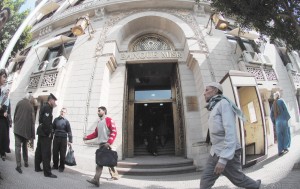
(DNE Photo)
By Sara Aggour, Doaa Farid, Nada Badawi
Following the release of financial reports for the first half of the year, a number of banks have recorded consistent profits despite the economic challenges that the sector has been facing for two years since the January 25 Revolution.
Faisal Islamic Bank of Egypt announced net profits worth EGP 370.816m in the first half of 2013 compared to EGP 283.696m during the same period last year, marking a 31% increase.
“Despite the current economic challenges, the bank is maintaining the level of its investments,” said Abdel-Hamid Ahmed, the general head of public relations at Faisal Islamic Bank of Egypt.
National Societe Generale Bank (NSGB) meanwhile stated in its second quarter report that its income recorded EGP 486.5mn, marking an EGP51m increase compared to last year’s EGP 435.592mn in the same period. The bank’s total income also surged from EGP 785.572m in 2012 to EGP 949.667m in 2013.
“NSGB sustained its strong bottom-line performance with net profits of EGP 950m for 1H13 [first half of 2013], 21% growth compared to 1H12 with decent growth across all the revenue streams,” the bank said in a statement issued on July 10.
“The strongly embedded risk management practices helped minimise the detrimental impact on the quality of the lending portfolio and the bank’s profitability despite the prolonged unfavourable economic environment,” the statement added.
However, Osama El-Manyalawy, an assistant general manager at a banking corporation, said that the primary driver behind profits lies in the banks’ usage of governmental treasury bills and bonds, which happen to be of “zero risk”.
El-Manyalawy also stated that banks operate differently from one to the other, relying on different strategies when dealing with the political upheaval of the country.
“I can’t speak for all banks that these are the reasons behind profits, but let’s not forget that the majority of them that reported profits are prominent banks in the country that already deal with high-profile clients who will bear the repercussions of political or economic changes in the country,” he said.
Other banks, namely Credit Agricole Egypt and Commercial International Bank (CIB), reported profits as well. In its financial report for the second quarter in 2013 issued this June, Credit Agricole Egypt reported that its net profit hit EGP 203.6mn between April 1 and June 30, compared to EGP 137.018m during the same quarter last year. The report revealed the half year profits, which registered EGP 365.4m, grew by 38.7% compared to 2012.
As for the CIB, the bank reported on 31 August that its net income rose to EGP 671m in the second quarter of 2013. The bank’s net income in the first quarter of 2012 reached EGP 658m.
“CIB’s effective risk management and strong track record bode well in the face of a difficult economic and credit environment. The bank has a commanding position in the Egyptian market as one of the largest and most successful private sector banks,” credit rating agency Capital Intelligence (CI) said.
In spite of these achievements, Egypt’s credit has reached “junk status” by leading credit rating agencies worldwide following the political unrest that followed the uprising in 2011 that ousted Hosni Mubarak. A number of leading international agencies such as Capital Intelligence (CI), Moody’s, Fitch Ratings among others, have been downgrading the ratings of several Egyptian banks due to the country’s poor economic performance and slow economic growth.
This March, Moody’s cut Egypt’s credit rating by one notch from B3 to Caa1, which it said meant it now sees nearly a 10% chance of Egypt defaulting on its debt over the next year and slightly less than a 40% chance of a default within five years.
On 19 July, global research consultancy firm IHS downgraded Egypt’s banking sector to “significant risk”, citing banks’ large holdings of sovereign debt, which comprise an estimated 40% of the country’s GDP.
The global firm stated in a press release issued at the time that, despite the moderate amount of credit supplied by Egyptian banks to the economy, which averaged 6% per year between 2010 and 2012, the country’s political turmoil still “raises credit risk factors significantly.”
The report explained the ongoing political unrest could negatively impact the ability of all borrowers to cover the repayment of interest and principal on a debt, and deteriorate the financial position of the government.
In the same month, Fitch Ratings downgraded Egypt’s issuer default ratings and country ceiling from B to B-, following the unrest that took place after the military deposed former president Mohamed Morsi amid mass demonstrations. The company cited “heightened uncertainty” and “inflamed political tensions” as reasons likely to jeopardise the country’s economy and creditworthiness.
On 3 August, Moody’s downgraded the Bank of Alexandria’s local currency deposit rating one notch, from B2 to B3.




